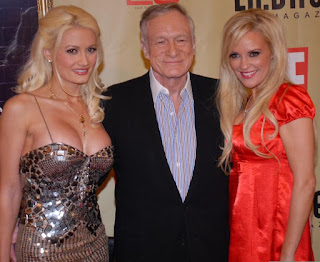Hugh Hefner

In the news: Hugh Hefner has died. I certainly won't miss him. I always thought him to be a pathetic creep. His claim to fame is that he commercialized sexism, normalizing women as things to be appraised and used by those people (you know, men) with enough money to rent/lease/buy them. He sold himself as a liberal but he was a porn broker, and as studies have shown, it's conservatives who love porn.
People who are young now probably don't give a thought to Hefner, but when my sister and I were teens we thought of him and guys like him as the "lucky Pierre generation" .... middle-aged men who thought anything was possible and everything permitted as long as they had enough money .... think Trump (who was a visitor to the Playboy mansion, and was on one of the covers of the magazine natch).
How Hugh Hefner’s Incredibly Complicated Legacy Got Cast as Female Sexual Liberation
[T]he effects of a few articles and donations will pale in comparison to the two signature pillars of Hefner’s memory: his naked photos and his lifestyle. Hefner kicked off his new magazine at age 27 with an act of exploitation, spending $500 on the rights to an existing naked photograph of Marilyn Monroe and running it without her consent. In the decades that ensued, he earned millions off the bodies of the women in Playboy while spinning it as a win for sexual liberation. Women can and do enjoy sex, and they should be allowed to show it, Hefner argued. Fair point! But the women in Playboy, no matter how much they enjoy posing nude and reaping what minimal payment comes of it, are not doing sexy things on their own terms—they’re following the explicit instructions of the men who make and buy the magazine. When I looked at Playboy’s encyclopedic collection of 734 centerfolds earlier this month, it struck me that the bodies in the magazine functioned as both a reflection of and prescription for male desire that, by the ‘90s, Hefner and his acolytes had made into hairless, glistening, plumped-up forms into which no human could ever transform. This monthly collection of photos of women’s vulvas and breasts, bookended by sometimes-serious journalism, is now considered something far more mainstream than porn, no matter how garish the lights. Hefner didn’t just help make the commodification of female flesh into a multimillion-dollar industry. With his bourgeois gloss and chatter about sexual freedom, he made it the topic of respectable conversation. Perhaps his most stunning rhetorical feat was convincing a certain segment of women—and men, for that matter—that women could channel power from the patriarchy if they performed sexual desirability for men.
There was also the life Hefner led, which became more absurd and piteous with every year. He left his first wife and two children in 1959, the better to make good on the promiscuous lifestyle he sold to his readers. Men since time immemorial have certainly fantasized about leaving their ho-hum desk jobs, banal home lives, and burdensome spawn to become internationally known for their material and carnal acquisitions. Hefner gave them hope that this seductive narrative did not have to be restricted to the realm of fiction. His Playboy Mansion, the site of more than one alleged sexual assault, was the ultimate man cave: a place where, regular dudes imagined, every surface was meant for sex and every woman was meant to be fucked. Take a quick scroll through Twitter today and you’ll find dozens of men asking women for nude photos “in honor of” Hefner’s memory ....
No, Hugh Hefner Did Not Love Women
[...] What Hefner and Playboy never did was present women as human, or consider us anything like men. Hefner made female sex objects more relatable and accessible — the Playboy centerfold was the girl next door, not the famous movie actress —but this wasn't so much an elevation as a downward shift: social permission for men to look at all women through the zipper in their jeans, and not even bother to pretend it was otherwise .... He didn’t fundamentally challenge a view of sex as something women provide to men and that is primarily about male pleasure and experience, with women in a performative role. If anything, he took that existing sexual imbalance and magnified it, creating a brand that is synonymous with sexualized women being gazed at as things a man might want to acquire.
More: Hugh Hefner preached sexual liberation, but he never stopped exploiting women's bodies ... Hugh Hefner, the murder of Dorothy Stratten and the dark side of Playboy


0 Comments:
Post a Comment
<< Home